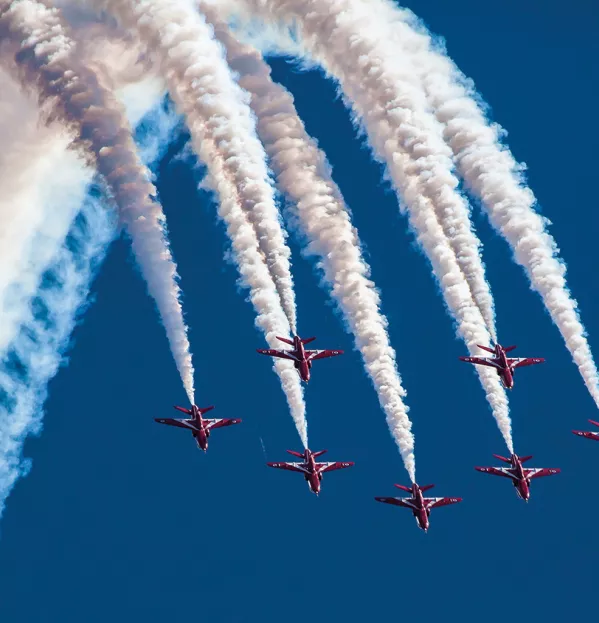What the RAF can teach schools about leaders and diversity

Amid the applause and congratulations at last year’s Tes School Awards, for which I was a judge, you would have spotted me in deep conversation with two members of the armed forces. The RAF is one of the lead sponsors of the annual prize giving - I was sat next to a group captain and a more recent recruit.
The two women challenged some of the assumptions levelled at the RAF, in relation to elitism and gender inequality when it comes to leadership - issues that also affect our schools. I queried aspects of social mobility and whether the RAF had also come close to representing the diverse communities we teach.
Group Captain Wendy Rothery responded by inviting me to visit RAF Cranwell, with complete access to officer interviews, leadership recruitment training and senior staff. In return, I was asked to provide some constructive criticism. I happily accepted and I am glad I did, because there are many lessons that can be applied to our schools.
RAF Cranwell is the officer recruitment and training base for the RAF. It has impressive facilities, but it was the sense of purpose from all observed that really struck me. I encountered diverse applicants keen to embrace a variety of roles.
Selection to become an officer involves several stages. Applicants sit an aptitude test, go through selection interviews, a health assessment, a fitness test, and a pre-recruitment training course, all prior to acceptance and full training.
Command and collaborate
Over several days, I observed practical sessions, group discussion, planning and a “leaderless” exercise, which challenged the group to establish a leader, whom they supported fully, all the while still demonstrating their own leadership skills.
I then watched each applicant assigned a “command”, which required them to remember tactical instructions and assign roles for the completion of a task.
This was followed by individual planning, which established the candidate’s ability to problem solve and communicate effectively, in addition to determining their confidence and resilience levels under pressure.
Initially, the more confident applicants stood out, but the exercise was designed to focus on people with the ability to influence, solve problems and work as a team, in much the same way as referenced in GCSE drama and PE - these two subjects could provide further guidance ahead of the selection process.
The tasks also highlighted those who could encourage, support and inspire others to realise their full potential.
This initial officer training is intended to prepare you for life as a leader. Once graduated, applicants will also have earned a Level 5 Diploma from the Institute of Leadership and Management and valuable credits toward an FE qualification.
Overall, it is a highly impressive programme for training leaders. It should be looked at closely by schools for hints and tips for students, but arguably more importantly for how we train teachers to lead.
I was privileged to sit in on some interviews, including the constructive feedback provided to those who were unsuccessful. Like many school leaders, I have provided interview training to pupils throughout my career and it was noticeable that some candidates were more familiar with interview techniques than others. I reflected on how there is still more that could be offered in schools to assist with such a crucial area.
In addition, school leaders face daily challenges in relation to promoting science, technology, engineering and maths (Stem) subjects to young women, especially from certain ethnic groups, so it is encouraging that the RAF has recently supported over 320 women through a range of engineering taster activities as part of its support for Stem and more than 50 per cent of the women who participated have moved on to Stem courses or careers.
Apprenticeship possibilities
There are clearly lessons to be learned from the successes of their engagement and I would encourage careers officers and those delivering PSHE to review the opportunities available through the RAF as early as Year 8, so that Year 9 and 11 options evenings include reference to such leadership and apprenticeship possibilities, particularly when faced with talented pupils for whom university does not appeal.
But where we should particularly train our eyes is the explicit focus on “teaching” leadership: this should be something we replicate for how we approach CPD in schools. We are so busy concentrating on knowledge that we can forget how important teaching leadership skills can be.
All too often the first thing we sacrifice, because of financial constraints, is the CPD budget, leaving those early in their career to stumble on successful ways to enhance their leadership skills in the classroom, as well as in the wider community.
My visit highlighted the intensity of the leadership training, the high bar for being accredited, the comprehensive approach and the links with other bodies. This is the direction we should be headed in education.
The RAF takes leadership very seriously, because it matters. Schools have some of the best leaders in the world, but with succession still an issue, how confident are we that future leaders can meet the same challenge?
Deborah Leek-Bailey is a former head and the founding director of DLB Leadership Associates
You need a Tes subscription to read this article
Subscribe now to read this article and get other subscriber-only content:
- Unlimited access to all Tes magazine content
- Exclusive subscriber-only stories
- Award-winning email newsletters
Already a subscriber? Log in
You need a subscription to read this article
Subscribe now to read this article and get other subscriber-only content, including:
- Unlimited access to all Tes magazine content
- Exclusive subscriber-only stories
- Award-winning email newsletters